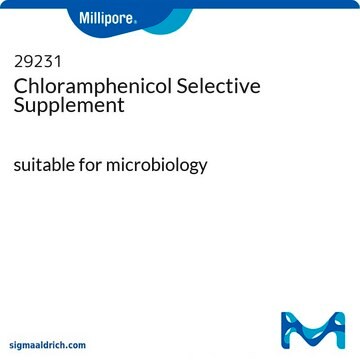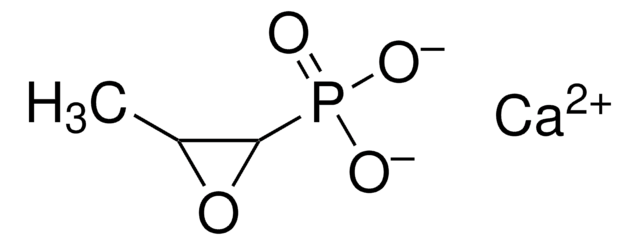C1200000
Chloramphenicol
European Pharmacopoeia (EP) Reference Standard
Sinónimos:
D-(−)-threo-2,2-Dichloro-N-[β-hydroxy-α-(hydroxymethyl)-β-(4-nitrophenyl)ethyl]acetamide, D-(−)-threo-2-Dichloroacetamido-1-(4-nitrophenyl)-1,3-propanediol, D-threo-2,2-Dichloro-N-[β-hydroxy-α-(hydroxymethyl)-4-nitrophenethyl]acetamide, Chloromycetin
About This Item
Productos recomendados
grade
pharmaceutical primary standard
API family
chloramphenicol
manufacturer/tradename
EDQM
mp
149-153 °C (lit.)
application(s)
pharmaceutical (small molecule)
format
neat
SMILES string
OC[C@@H](NC(=O)C(Cl)Cl)[C@H](O)c1ccc(cc1)[N+]([O-])=O
InChI
1S/C11H12Cl2N2O5/c12-10(13)11(18)14-8(5-16)9(17)6-1-3-7(4-2-6)15(19)20/h1-4,8-10,16-17H,5H2,(H,14,18)/t8-,9-/m1/s1
InChI key
WIIZWVCIJKGZOK-RKDXNWHRSA-N
¿Está buscando productos similares? Visita Guía de comparación de productos
General description
Application
Biochem/physiol Actions
Modo de resistencia: Acetilación por cloranfenicol-acetiltransferasa (gen cat).
Packaging
Other Notes
Related product
signalword
Danger
hcodes
Hazard Classifications
Carc. 2 - Eye Dam. 1 - Repr. 2
Storage Class
11 - Combustible Solids
wgk_germany
WGK 3
Elija entre una de las versiones más recientes:
Certificados de análisis (COA)
Lo sentimos, en este momento no disponemos de COAs para este producto en línea.
Si necesita más asistencia, póngase en contacto con Atención al cliente
¿Ya tiene este producto?
Encuentre la documentación para los productos que ha comprado recientemente en la Biblioteca de documentos.
Los clientes también vieron
Nuestro equipo de científicos tiene experiencia en todas las áreas de investigación: Ciencias de la vida, Ciencia de los materiales, Síntesis química, Cromatografía, Analítica y muchas otras.
Póngase en contacto con el Servicio técnico








